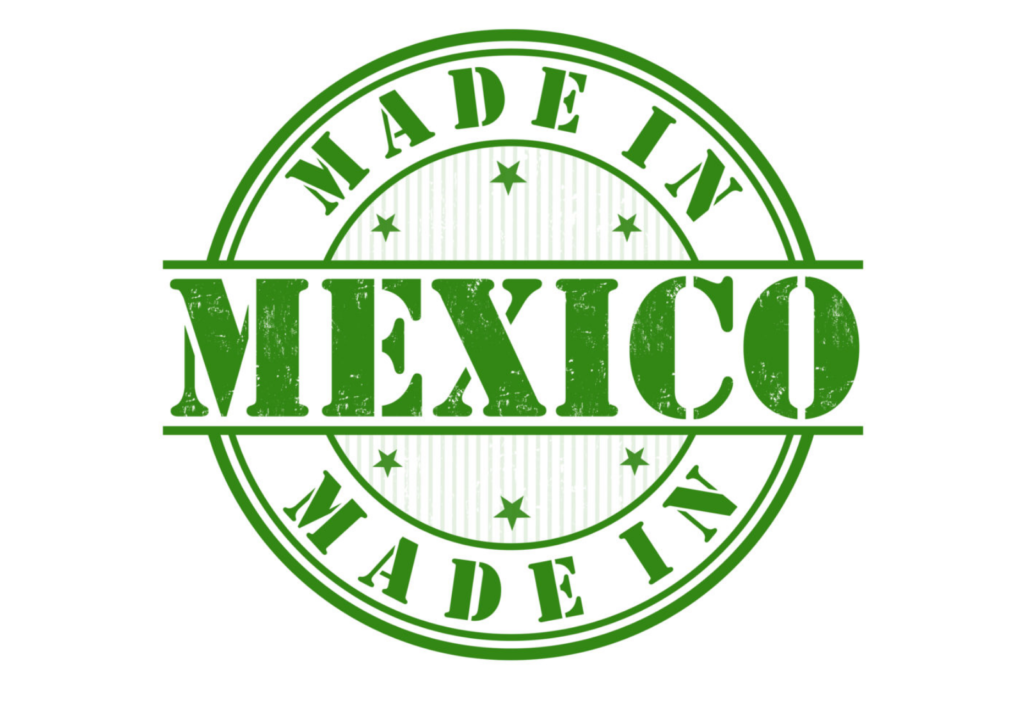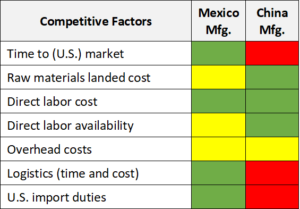Last week, in “Mexico is the New China” and Manufacturers are Moving There, we wrote about how so many companies that have their products manufactured in China are increasingly looking to move that manufacturing from China to Mexico. As a good indicator of the relevancy of this issue, our Linkedin post on this (go here) already has 57 comments and nearly 10,000 views.
One of the things slowing down manufacturing moving from China to Mexico is that Mexico focuses much less on contract manufacturing and much more on “shelter manufacturing” than China. This difference in manufacturing methods has given pause to companies looking to move their manufacturing from China to Mexico by essentially duplicating what they have been doing in China. One of the big issues our Mexico manufacturing lawyers are encountering with clients looking to manufacture in Mexico is a lack of understanding about shelter manufacturing.
In an effort to explain Mexico shelter manufacturing to our readers, we asked Eduardo Saavedra, Executive Vice President of Business Development for Tetakawi, to write about it. Tetakawi was Mexico’s first shelter provider and it has been Mexico’s largest shelter provider for more than 35 years. Tetakawi today has approximately 30,000 employees and it does a terrific job helping all sorts of foreign companies get their products cost effectively manufactured in Mexico, increasing including companies moving their manufacturing from China to Mexico.
The below is Eduardo’s post.
For reasons that include political uncertainty, time-to-market, landed-cost, and supply-chain risks, an increasing number of U.S. companies are investigating their options for removing manufacturing operations from China and moving them to Mexico.
Mexico’s proximity to the U.S. addresses time-to-market issues, and the United States–Mexico–Canada Agreement (USMCA) eliminates import duties for goods originating in the U.S., Mexico, and Canada, representing significant landed-cost reductions, especially considering U.S. Section 301 import duties on China-origin goods, which average 25%.
Unfortunately for most U.S. goods producers, Mexico does not have a contract manufacturing industry at the scale and specialty level available in China . In addition to a shortage of established contract manufacturers in Mexico that have achieved high levels of productivity and efficiencies across multiple industries, the supply chain to existing contract manufacturers relies largely on raw material sources in the U.S. and of course in China and other Asian countries, as well as in small part on raw materials and components sourced in Mexico.
In supply and demand terms, there is a clear demand for contract manufacturing in Mexico, and the logical response is for Chinese and U.S. contract manufacturers to set up operations in Mexico. Regionalizing manufacturing is not a novel idea, but cultural disconnects, labor capacity, governmental regulations, supply chains, and investment requirements often prevent regionalization from materializing.
Below is a quick look at the advantages and disadvantages of Mexico versus China for manufacturing goods destined for U.S. markets:
For China or even U.S.-based contract manufacturers, Mexico represents a sustainable, long-term, low-labor-cost country alternative to China for goods sold in North America. And Chinese or U.S. (or other) contract manufacturers can establish manufacturing operations in Mexico in one of three ways:
1. As a standalone, greenfield, independent operation with some assistance from third parties.
2. As a “Shelter company” that operates within a manufacturing community or industrial park.
3. As a Shelter company during the startup period with an eventual transition to standalone operation.
Below is the Shelter business model explained:
- A Shelter company is a Mexican legal entity that has an established place of business in one or more locations in Mexico. The Shelter company is fully registered, authorized, licensed, and compliant with Mexican governmental laws and regulations that apply to manufacturing activities, especially when the manufactured goods are exported from or within the country.
- Foreign companies of any size and in any industry manufacturer their goods in Mexico through the legal framework of the Shelter company without having to establish their own legal entity/company in Mexico.
- Shelter companies may or may not own the industrial buildings/space in which their foreign clients manufacture goods in Mexico, but typically assist clients in identifying an optimal location.
- In addition to providing foreign companies with a legal framework in Mexico, the Shelter company can provide services relating to labor management, importing and exporting, local procurement of consumable supplies and services, and compliance/assistance with labor, taxes, environmental, health and safety, and other Mexican laws.
- The Shelter Company is not a contract manufacturer. It provides the foreign manufacturer with full control over the employees, its production assets, and its production functions without the administrative and regulatory burdens and risks, and without the potentially long lead times for obtaining certain relevant permits and authorizations.
- The Shelter company does not own machinery, equipment, raw materials, finished goods, auxiliary goods, intellectual property, designs, or other property, which are owned and controlled by the foreign company while it operates in Mexico through the Shelter company’s legal framework.
- Shelter companies, as well as their foreign clients, are subject to income taxes in Mexico, which may be deductible or creditable in the foreign country, depending on tax treaties.
- Contractual relationships with a Shelter company can be short or long-term.
- Shelter company fees are typically variable costs to the foreign client. In standalone operations, overhead costs are for the most part fixed. Shelter company fees are often tied to the total number of employees in a factory or to the payroll amount. When factory employment rises, so does the shelter fee; when employment decreases, the shelter fee goes down.
Shifting manufacturing operations to a new country can be daunting and shifting your manufacturing to Mexico is no different in this. But Mexico Shelter companies resolve two important issues: (1) the foreign company does not need to establish a legal presence in Mexico with all its attendant regulatory obligations, and (2) the Shelter company can carry out functions not directly related to production, so the foreign company’s focus can remain on productivity, efficiencies, quality, delivery.


























